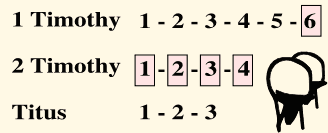|
|
||
Tensions in the church can lessen the confidence of a pastor. Paul wrote these letters probably around 62 A.D. to encourage these two church appointees to stand strong in God's Word so that God's sheep might be protected. |
|
|
Solutions Churches Might Use |
||
Paul supplied a great number of instructions and exhortations to these young pastors so that they might stand strong in their calling to God and faithfully carry out the needed steps to protect the flock of God. |
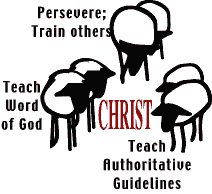 |
|
Project: Church Health
|
||
This is what Paul does in these
|
Think of a church that you are familiar with.
Identify any struggles that are threatening the welfare of that church.
 Be objective as ______________.
Be objective as ______________.
 Briefly describe each ______________.
Briefly describe each ______________.
 Identify what harm is threatening God's ______________.
Identify what harm is threatening God's ______________.
 Take steps to strengthen that which is being ______________.
Take steps to strengthen that which is being ______________.

#1 Difference in church policies |
|
The main purposes of 1 Timothy and Titus seem to focus on helping the pastors to rightly handle different church problems and policies. In this case inefficient or nonexistent policies enabled false teachers to exert undue influence on the church. Often a pastor is unaware of problems until numerous people have been hurt. Each new wave of false doctrine leads to clearer standards. |
|
Teach Authoritative Guidelines |
|
|
|
"But in case I am delayed, I write so that you may know how one ought to conduct himself in the household of God, which is the church of the living God, the pillar and support of the truth.
|
The solution for difference among church policies is to clarify or define them, teach them and enforce them. Remember that this is not a discussion of personal preference or tradition. We are speaking about the truth of God. If we carefully establish thee principles of truth, God's people will be blessed. If not, the church would lose its salt and light and be good for nothing. |
|
Project: Church Policies
|
|

#2 False Teachers |
|
False teachers are as destructive today as ever.Although we are not sure how long after his departure from Ephesus, that Paul wrote these letters to Timothy, we can see Paul battling strong to hold the Ephesus church pure and strong.
|
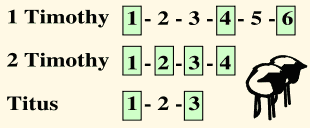 |
Teach the Word of God |
|
|
|
You will note from the chart above, while Paul was busy confronting these false teachers in his letters, Satan was doing his best to hold back the advance of the gospel to the world.Timothy was probably converted on the latter part of Paul's first missionary journey. On Paul's second missionary journey, he was ordained and circumcised. We know that both Titus and Timothy were sent on missions while Paul was in Ephesus during 54-56 A.D. Titus was sent to Corinth (2 Cor 8:6) and Timothy to Macedonia (Acts 19:21-22). However, it is not at this time these pastoral epistles were written but later (62-63 A.D.) closer to his death (64 A.D.).Later, after Paul’s first imprisonment in Rome (end of Acts), he was released. At one point after visiting Crete, he left Titus behind (Titus 1:5) and went to Macedonia (1 Timothy 1:3). There he wrote both 1 Timothy, which he sent to Timothy in Ephesus, and Titus, which he sent to Crete by Zenas and Apollos (Titus 3:13). 2 Timothy was written during his second imprisonment in Rome and finally was put to death by Nero as the persecution against Christians rose up in 64 A.D.Paul was very critical of these false teachers, but he took very strong positive steps to counter their efforts. We partly see this in these pastoral epistles. |
|
|
Paul countered these false teachers by focusing on at least four things.1
|
|

#3 Oppression and Persecution |
|
We can feel the intensity of the fight against Paul in 2 Timothy as he prepares to give his life for Christ. He is concerned that Timothy also endure the fight.After Paul was released from his first imprisonment, he wrote wrote 1 Timothy and Titus from Macedonia (1 Timothy 1:3). It appears that he was again arrested in 64 A.D. and before he was martyred wrote 2 Timothy from Rome. |
|
Persevere and Train Others"And the things which you have heard from me in the presence of many witnesses, these entrust to faithful men, who will be able to teach others also." (2 Timothy 2:2).
|
|
Paul wasn't sure how long he would be around. Notice the way Paul encouraged Timothy to pass the gospel on.List the four generations of believers mentioned in 2 Timothy 2:2. |
Four Generation of Believers |
GOAL: Able to Teach
|
|
 Most of BFF articles such as this one is nicely formatted for printing. This article also has a handout. Check out the great number of articles, slides, handouts, study questions, videos and audios in the BFF 7 Digital Libraries!Read here for testimonies.
Most of BFF articles such as this one is nicely formatted for printing. This article also has a handout. Check out the great number of articles, slides, handouts, study questions, videos and audios in the BFF 7 Digital Libraries!Read here for testimonies.
BFF Homepage | Top | Back | Discipleship | Reference Page
NASB used
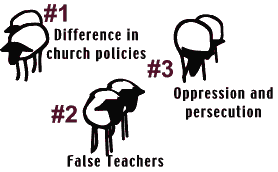
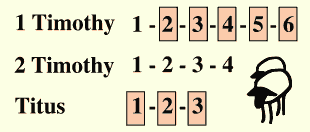
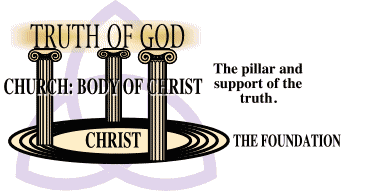
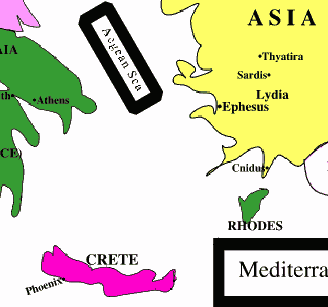
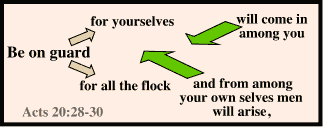 Acts 20:17, 28-31
Acts 20:17, 28-31